Bioethics and the Sale of Organs by Living Donors: An Ethical Analysis
VerifiedAdded on 2022/08/14
|7
|1986
|361
Essay
AI Summary
This essay delves into the bioethical complexities surrounding the sale of organs by living donors, particularly focusing on the exploitation of individuals in developing nations. It explores the core debate of whether humans own their bodies, and if this ownership justifies the commercialization of organs. The paper examines the ethical viewpoints of Kantianism and Utilitarianism, analyzing how these frameworks justify or condemn organ sales and trafficking. It highlights the ethical concerns related to the exploitation of vulnerable populations, the health risks faced by donors, and the implications of organ sales within the context of global bioethics. The analysis references statistics on organ sales and provides an overview of key literature in the field, including works by Andorno, Boas, DePergola, and others. The conclusion emphasizes the unethical nature of organ sales from a utilitarian perspective, while acknowledging the Kantian perspective, and highlighting the importance of considering the overall impact on donors and the ethical dimensions of organ trafficking.
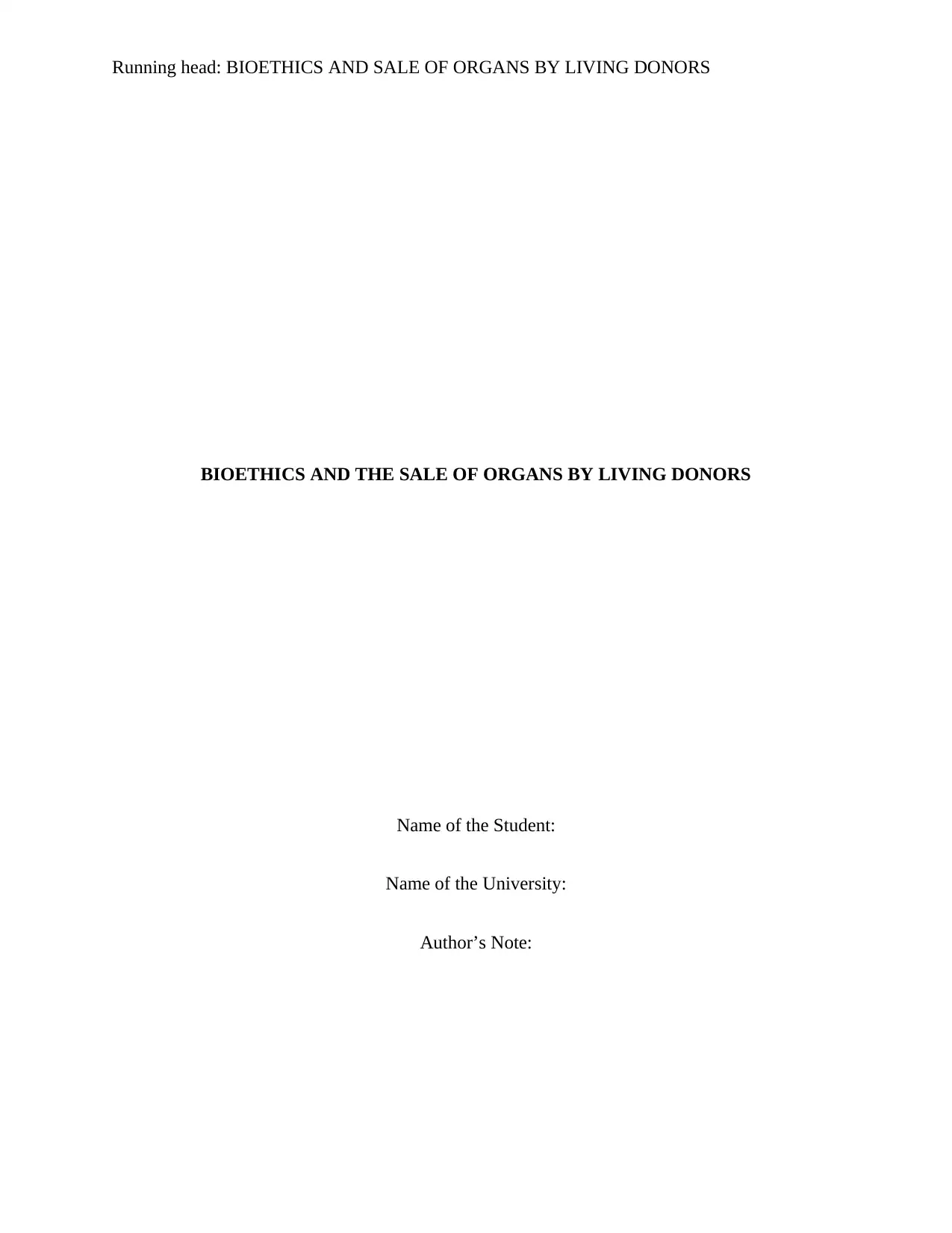
Running head: BIOETHICS AND SALE OF ORGANS BY LIVING DONORS
BIOETHICS AND THE SALE OF ORGANS BY LIVING DONORS
Name of the Student:
Name of the University:
Author’s Note:
BIOETHICS AND THE SALE OF ORGANS BY LIVING DONORS
Name of the Student:
Name of the University:
Author’s Note:
Paraphrase This Document
Need a fresh take? Get an instant paraphrase of this document with our AI Paraphraser
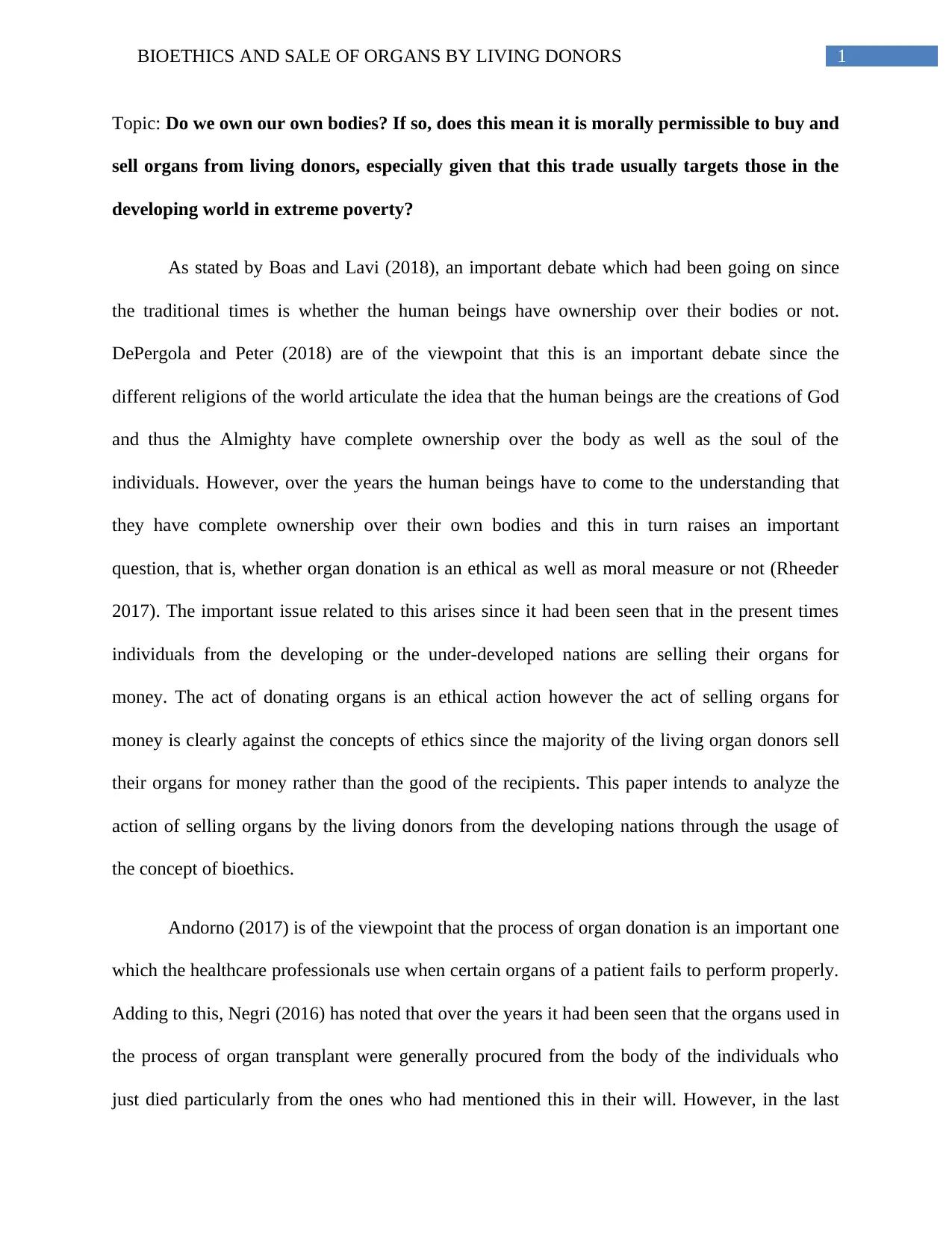
1BIOETHICS AND SALE OF ORGANS BY LIVING DONORS
Topic: Do we own our own bodies? If so, does this mean it is morally permissible to buy and
sell organs from living donors, especially given that this trade usually targets those in the
developing world in extreme poverty?
As stated by Boas and Lavi (2018), an important debate which had been going on since
the traditional times is whether the human beings have ownership over their bodies or not.
DePergola and Peter (2018) are of the viewpoint that this is an important debate since the
different religions of the world articulate the idea that the human beings are the creations of God
and thus the Almighty have complete ownership over the body as well as the soul of the
individuals. However, over the years the human beings have to come to the understanding that
they have complete ownership over their own bodies and this in turn raises an important
question, that is, whether organ donation is an ethical as well as moral measure or not (Rheeder
2017). The important issue related to this arises since it had been seen that in the present times
individuals from the developing or the under-developed nations are selling their organs for
money. The act of donating organs is an ethical action however the act of selling organs for
money is clearly against the concepts of ethics since the majority of the living organ donors sell
their organs for money rather than the good of the recipients. This paper intends to analyze the
action of selling organs by the living donors from the developing nations through the usage of
the concept of bioethics.
Andorno (2017) is of the viewpoint that the process of organ donation is an important one
which the healthcare professionals use when certain organs of a patient fails to perform properly.
Adding to this, Negri (2016) has noted that over the years it had been seen that the organs used in
the process of organ transplant were generally procured from the body of the individuals who
just died particularly from the ones who had mentioned this in their will. However, in the last
Topic: Do we own our own bodies? If so, does this mean it is morally permissible to buy and
sell organs from living donors, especially given that this trade usually targets those in the
developing world in extreme poverty?
As stated by Boas and Lavi (2018), an important debate which had been going on since
the traditional times is whether the human beings have ownership over their bodies or not.
DePergola and Peter (2018) are of the viewpoint that this is an important debate since the
different religions of the world articulate the idea that the human beings are the creations of God
and thus the Almighty have complete ownership over the body as well as the soul of the
individuals. However, over the years the human beings have to come to the understanding that
they have complete ownership over their own bodies and this in turn raises an important
question, that is, whether organ donation is an ethical as well as moral measure or not (Rheeder
2017). The important issue related to this arises since it had been seen that in the present times
individuals from the developing or the under-developed nations are selling their organs for
money. The act of donating organs is an ethical action however the act of selling organs for
money is clearly against the concepts of ethics since the majority of the living organ donors sell
their organs for money rather than the good of the recipients. This paper intends to analyze the
action of selling organs by the living donors from the developing nations through the usage of
the concept of bioethics.
Andorno (2017) is of the viewpoint that the process of organ donation is an important one
which the healthcare professionals use when certain organs of a patient fails to perform properly.
Adding to this, Negri (2016) has noted that over the years it had been seen that the organs used in
the process of organ transplant were generally procured from the body of the individuals who
just died particularly from the ones who had mentioned this in their will. However, in the last
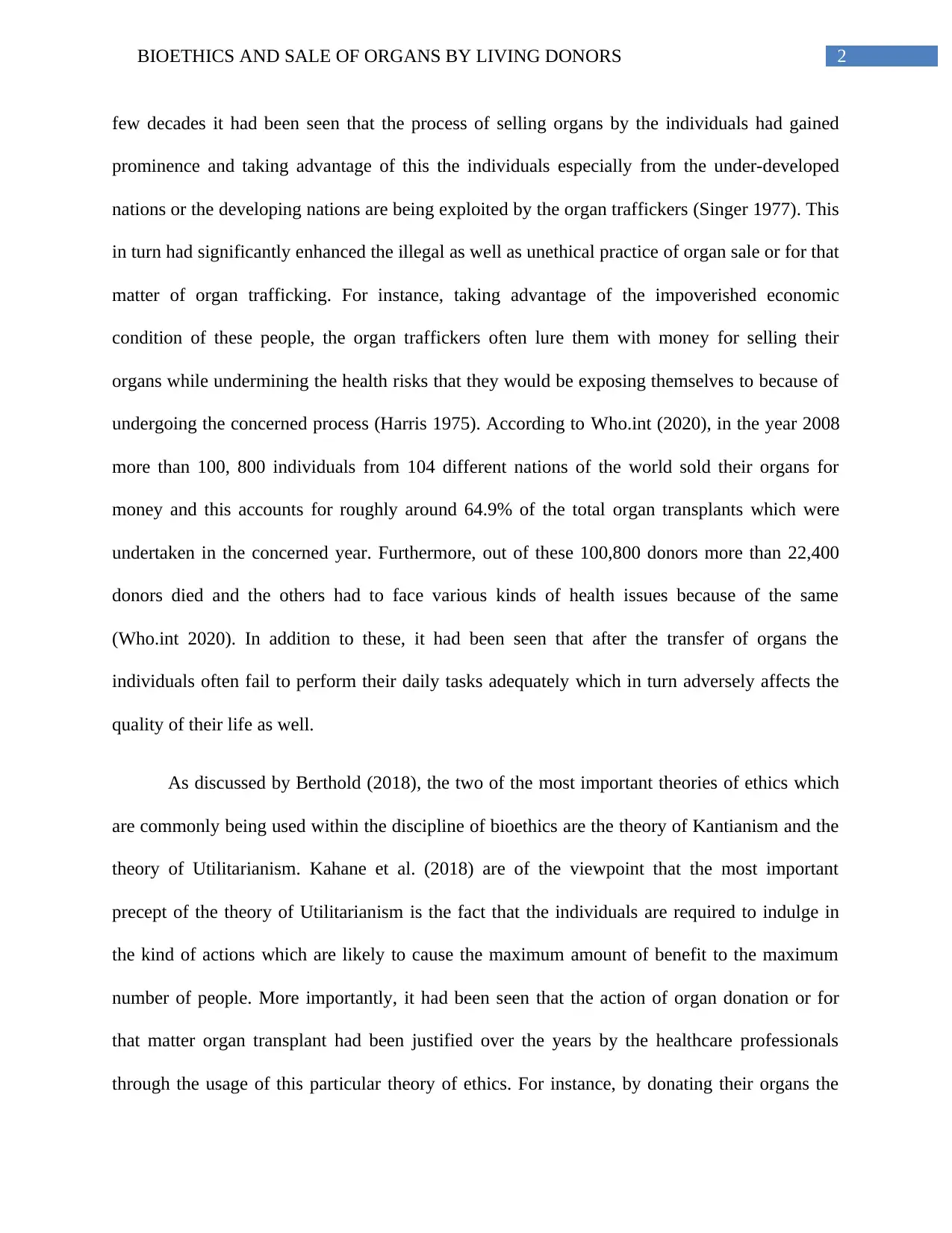
2BIOETHICS AND SALE OF ORGANS BY LIVING DONORS
few decades it had been seen that the process of selling organs by the individuals had gained
prominence and taking advantage of this the individuals especially from the under-developed
nations or the developing nations are being exploited by the organ traffickers (Singer 1977). This
in turn had significantly enhanced the illegal as well as unethical practice of organ sale or for that
matter of organ trafficking. For instance, taking advantage of the impoverished economic
condition of these people, the organ traffickers often lure them with money for selling their
organs while undermining the health risks that they would be exposing themselves to because of
undergoing the concerned process (Harris 1975). According to Who.int (2020), in the year 2008
more than 100, 800 individuals from 104 different nations of the world sold their organs for
money and this accounts for roughly around 64.9% of the total organ transplants which were
undertaken in the concerned year. Furthermore, out of these 100,800 donors more than 22,400
donors died and the others had to face various kinds of health issues because of the same
(Who.int 2020). In addition to these, it had been seen that after the transfer of organs the
individuals often fail to perform their daily tasks adequately which in turn adversely affects the
quality of their life as well.
As discussed by Berthold (2018), the two of the most important theories of ethics which
are commonly being used within the discipline of bioethics are the theory of Kantianism and the
theory of Utilitarianism. Kahane et al. (2018) are of the viewpoint that the most important
precept of the theory of Utilitarianism is the fact that the individuals are required to indulge in
the kind of actions which are likely to cause the maximum amount of benefit to the maximum
number of people. More importantly, it had been seen that the action of organ donation or for
that matter organ transplant had been justified over the years by the healthcare professionals
through the usage of this particular theory of ethics. For instance, by donating their organs the
few decades it had been seen that the process of selling organs by the individuals had gained
prominence and taking advantage of this the individuals especially from the under-developed
nations or the developing nations are being exploited by the organ traffickers (Singer 1977). This
in turn had significantly enhanced the illegal as well as unethical practice of organ sale or for that
matter of organ trafficking. For instance, taking advantage of the impoverished economic
condition of these people, the organ traffickers often lure them with money for selling their
organs while undermining the health risks that they would be exposing themselves to because of
undergoing the concerned process (Harris 1975). According to Who.int (2020), in the year 2008
more than 100, 800 individuals from 104 different nations of the world sold their organs for
money and this accounts for roughly around 64.9% of the total organ transplants which were
undertaken in the concerned year. Furthermore, out of these 100,800 donors more than 22,400
donors died and the others had to face various kinds of health issues because of the same
(Who.int 2020). In addition to these, it had been seen that after the transfer of organs the
individuals often fail to perform their daily tasks adequately which in turn adversely affects the
quality of their life as well.
As discussed by Berthold (2018), the two of the most important theories of ethics which
are commonly being used within the discipline of bioethics are the theory of Kantianism and the
theory of Utilitarianism. Kahane et al. (2018) are of the viewpoint that the most important
precept of the theory of Utilitarianism is the fact that the individuals are required to indulge in
the kind of actions which are likely to cause the maximum amount of benefit to the maximum
number of people. More importantly, it had been seen that the action of organ donation or for
that matter organ transplant had been justified over the years by the healthcare professionals
through the usage of this particular theory of ethics. For instance, by donating their organs the
⊘ This is a preview!⊘
Do you want full access?
Subscribe today to unlock all pages.

Trusted by 1+ million students worldwide
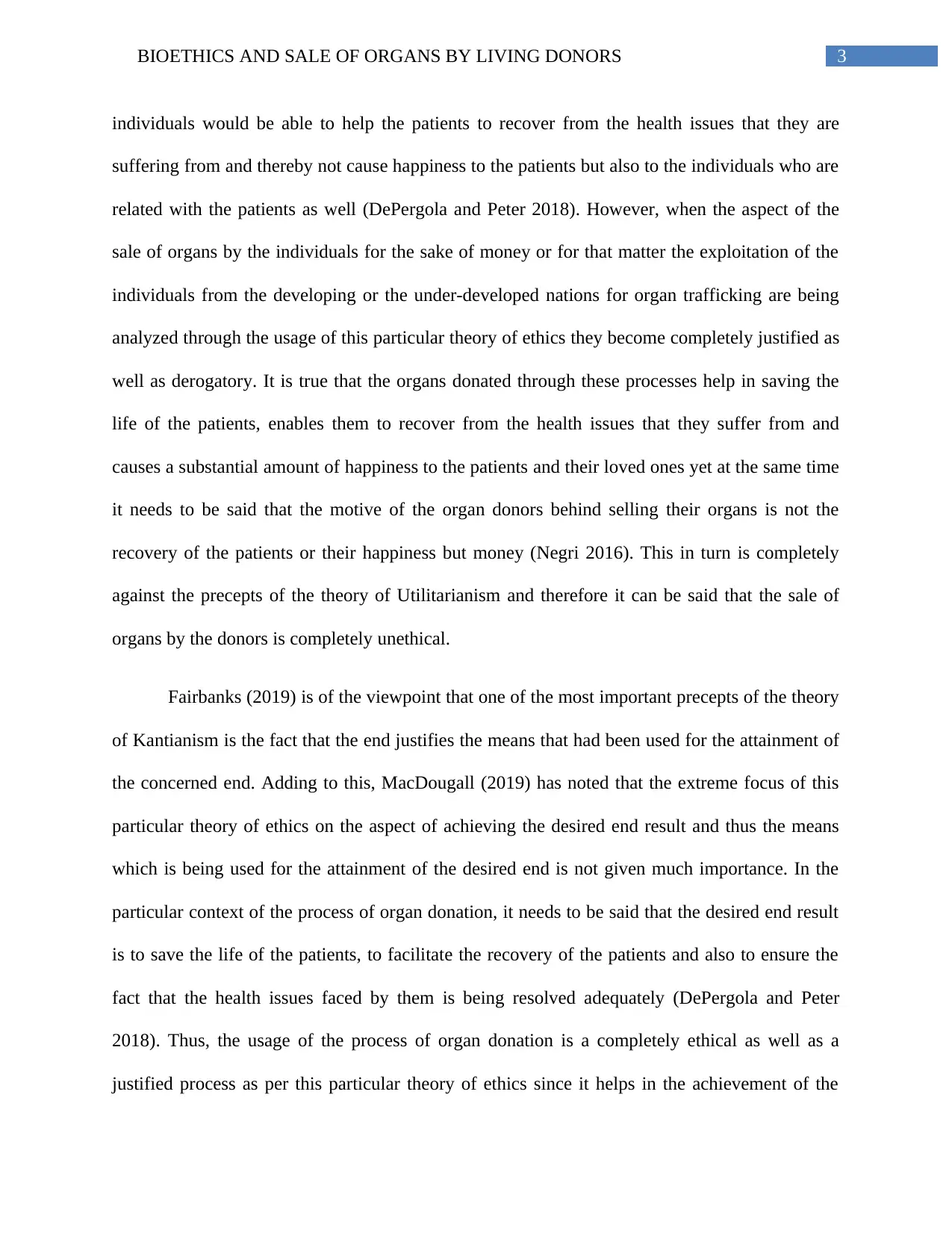
3BIOETHICS AND SALE OF ORGANS BY LIVING DONORS
individuals would be able to help the patients to recover from the health issues that they are
suffering from and thereby not cause happiness to the patients but also to the individuals who are
related with the patients as well (DePergola and Peter 2018). However, when the aspect of the
sale of organs by the individuals for the sake of money or for that matter the exploitation of the
individuals from the developing or the under-developed nations for organ trafficking are being
analyzed through the usage of this particular theory of ethics they become completely justified as
well as derogatory. It is true that the organs donated through these processes help in saving the
life of the patients, enables them to recover from the health issues that they suffer from and
causes a substantial amount of happiness to the patients and their loved ones yet at the same time
it needs to be said that the motive of the organ donors behind selling their organs is not the
recovery of the patients or their happiness but money (Negri 2016). This in turn is completely
against the precepts of the theory of Utilitarianism and therefore it can be said that the sale of
organs by the donors is completely unethical.
Fairbanks (2019) is of the viewpoint that one of the most important precepts of the theory
of Kantianism is the fact that the end justifies the means that had been used for the attainment of
the concerned end. Adding to this, MacDougall (2019) has noted that the extreme focus of this
particular theory of ethics on the aspect of achieving the desired end result and thus the means
which is being used for the attainment of the desired end is not given much importance. In the
particular context of the process of organ donation, it needs to be said that the desired end result
is to save the life of the patients, to facilitate the recovery of the patients and also to ensure the
fact that the health issues faced by them is being resolved adequately (DePergola and Peter
2018). Thus, the usage of the process of organ donation is a completely ethical as well as a
justified process as per this particular theory of ethics since it helps in the achievement of the
individuals would be able to help the patients to recover from the health issues that they are
suffering from and thereby not cause happiness to the patients but also to the individuals who are
related with the patients as well (DePergola and Peter 2018). However, when the aspect of the
sale of organs by the individuals for the sake of money or for that matter the exploitation of the
individuals from the developing or the under-developed nations for organ trafficking are being
analyzed through the usage of this particular theory of ethics they become completely justified as
well as derogatory. It is true that the organs donated through these processes help in saving the
life of the patients, enables them to recover from the health issues that they suffer from and
causes a substantial amount of happiness to the patients and their loved ones yet at the same time
it needs to be said that the motive of the organ donors behind selling their organs is not the
recovery of the patients or their happiness but money (Negri 2016). This in turn is completely
against the precepts of the theory of Utilitarianism and therefore it can be said that the sale of
organs by the donors is completely unethical.
Fairbanks (2019) is of the viewpoint that one of the most important precepts of the theory
of Kantianism is the fact that the end justifies the means that had been used for the attainment of
the concerned end. Adding to this, MacDougall (2019) has noted that the extreme focus of this
particular theory of ethics on the aspect of achieving the desired end result and thus the means
which is being used for the attainment of the desired end is not given much importance. In the
particular context of the process of organ donation, it needs to be said that the desired end result
is to save the life of the patients, to facilitate the recovery of the patients and also to ensure the
fact that the health issues faced by them is being resolved adequately (DePergola and Peter
2018). Thus, the usage of the process of organ donation is a completely ethical as well as a
justified process as per this particular theory of ethics since it helps in the achievement of the
Paraphrase This Document
Need a fresh take? Get an instant paraphrase of this document with our AI Paraphraser
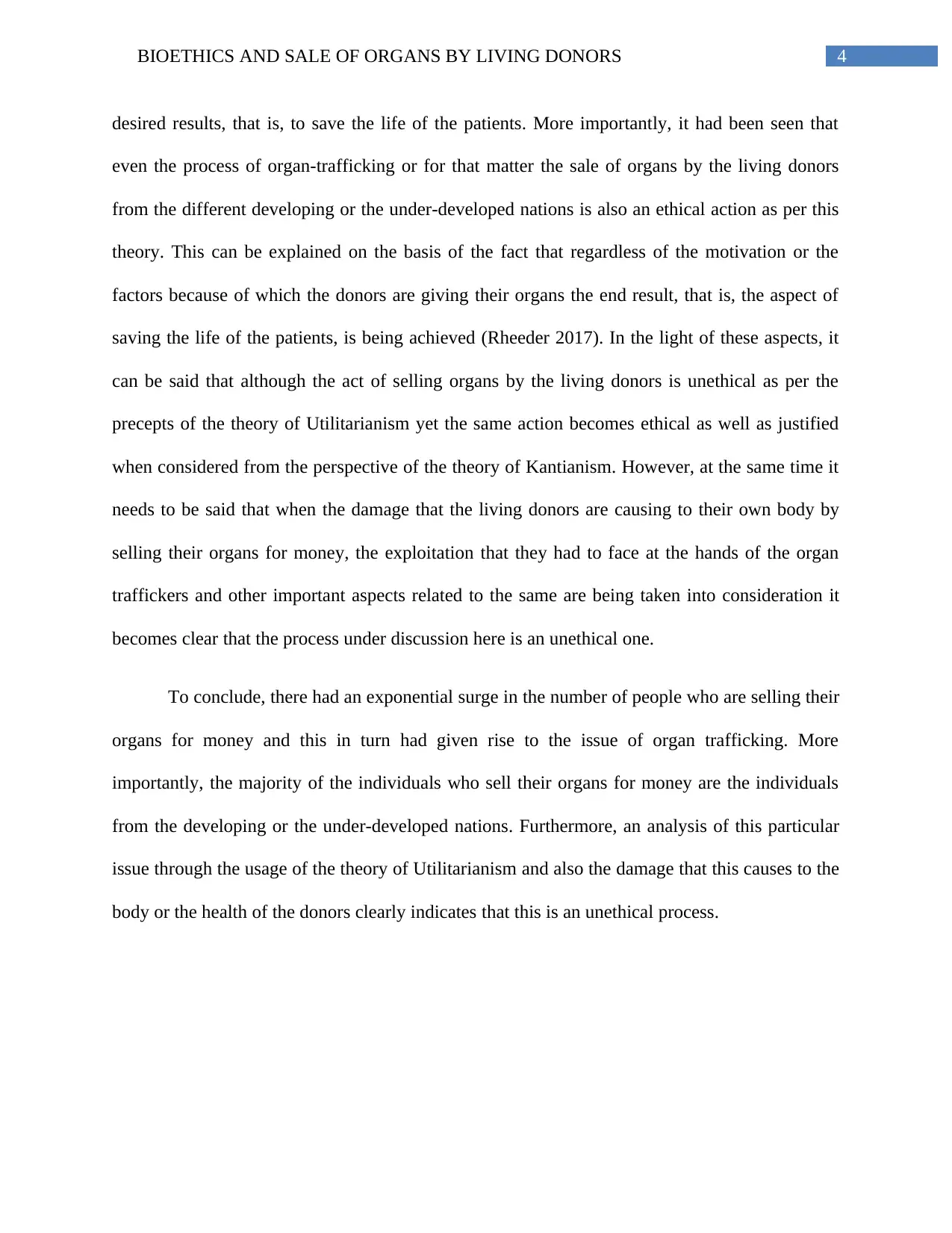
4BIOETHICS AND SALE OF ORGANS BY LIVING DONORS
desired results, that is, to save the life of the patients. More importantly, it had been seen that
even the process of organ-trafficking or for that matter the sale of organs by the living donors
from the different developing or the under-developed nations is also an ethical action as per this
theory. This can be explained on the basis of the fact that regardless of the motivation or the
factors because of which the donors are giving their organs the end result, that is, the aspect of
saving the life of the patients, is being achieved (Rheeder 2017). In the light of these aspects, it
can be said that although the act of selling organs by the living donors is unethical as per the
precepts of the theory of Utilitarianism yet the same action becomes ethical as well as justified
when considered from the perspective of the theory of Kantianism. However, at the same time it
needs to be said that when the damage that the living donors are causing to their own body by
selling their organs for money, the exploitation that they had to face at the hands of the organ
traffickers and other important aspects related to the same are being taken into consideration it
becomes clear that the process under discussion here is an unethical one.
To conclude, there had an exponential surge in the number of people who are selling their
organs for money and this in turn had given rise to the issue of organ trafficking. More
importantly, the majority of the individuals who sell their organs for money are the individuals
from the developing or the under-developed nations. Furthermore, an analysis of this particular
issue through the usage of the theory of Utilitarianism and also the damage that this causes to the
body or the health of the donors clearly indicates that this is an unethical process.
desired results, that is, to save the life of the patients. More importantly, it had been seen that
even the process of organ-trafficking or for that matter the sale of organs by the living donors
from the different developing or the under-developed nations is also an ethical action as per this
theory. This can be explained on the basis of the fact that regardless of the motivation or the
factors because of which the donors are giving their organs the end result, that is, the aspect of
saving the life of the patients, is being achieved (Rheeder 2017). In the light of these aspects, it
can be said that although the act of selling organs by the living donors is unethical as per the
precepts of the theory of Utilitarianism yet the same action becomes ethical as well as justified
when considered from the perspective of the theory of Kantianism. However, at the same time it
needs to be said that when the damage that the living donors are causing to their own body by
selling their organs for money, the exploitation that they had to face at the hands of the organ
traffickers and other important aspects related to the same are being taken into consideration it
becomes clear that the process under discussion here is an unethical one.
To conclude, there had an exponential surge in the number of people who are selling their
organs for money and this in turn had given rise to the issue of organ trafficking. More
importantly, the majority of the individuals who sell their organs for money are the individuals
from the developing or the under-developed nations. Furthermore, an analysis of this particular
issue through the usage of the theory of Utilitarianism and also the damage that this causes to the
body or the health of the donors clearly indicates that this is an unethical process.
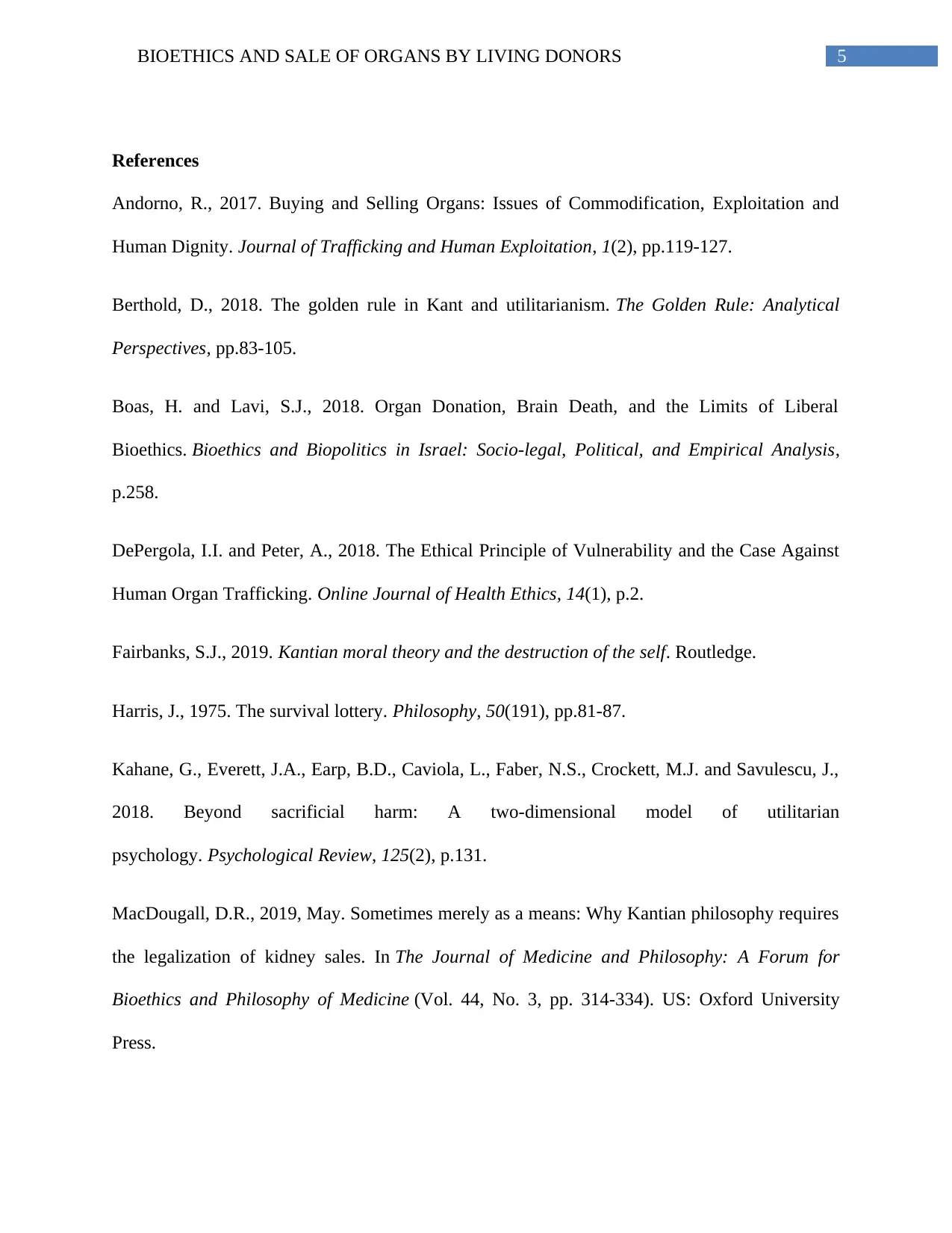
5BIOETHICS AND SALE OF ORGANS BY LIVING DONORS
References
Andorno, R., 2017. Buying and Selling Organs: Issues of Commodification, Exploitation and
Human Dignity. Journal of Trafficking and Human Exploitation, 1(2), pp.119-127.
Berthold, D., 2018. The golden rule in Kant and utilitarianism. The Golden Rule: Analytical
Perspectives, pp.83-105.
Boas, H. and Lavi, S.J., 2018. Organ Donation, Brain Death, and the Limits of Liberal
Bioethics. Bioethics and Biopolitics in Israel: Socio-legal, Political, and Empirical Analysis,
p.258.
DePergola, I.I. and Peter, A., 2018. The Ethical Principle of Vulnerability and the Case Against
Human Organ Trafficking. Online Journal of Health Ethics, 14(1), p.2.
Fairbanks, S.J., 2019. Kantian moral theory and the destruction of the self. Routledge.
Harris, J., 1975. The survival lottery. Philosophy, 50(191), pp.81-87.
Kahane, G., Everett, J.A., Earp, B.D., Caviola, L., Faber, N.S., Crockett, M.J. and Savulescu, J.,
2018. Beyond sacrificial harm: A two-dimensional model of utilitarian
psychology. Psychological Review, 125(2), p.131.
MacDougall, D.R., 2019, May. Sometimes merely as a means: Why Kantian philosophy requires
the legalization of kidney sales. In The Journal of Medicine and Philosophy: A Forum for
Bioethics and Philosophy of Medicine (Vol. 44, No. 3, pp. 314-334). US: Oxford University
Press.
References
Andorno, R., 2017. Buying and Selling Organs: Issues of Commodification, Exploitation and
Human Dignity. Journal of Trafficking and Human Exploitation, 1(2), pp.119-127.
Berthold, D., 2018. The golden rule in Kant and utilitarianism. The Golden Rule: Analytical
Perspectives, pp.83-105.
Boas, H. and Lavi, S.J., 2018. Organ Donation, Brain Death, and the Limits of Liberal
Bioethics. Bioethics and Biopolitics in Israel: Socio-legal, Political, and Empirical Analysis,
p.258.
DePergola, I.I. and Peter, A., 2018. The Ethical Principle of Vulnerability and the Case Against
Human Organ Trafficking. Online Journal of Health Ethics, 14(1), p.2.
Fairbanks, S.J., 2019. Kantian moral theory and the destruction of the self. Routledge.
Harris, J., 1975. The survival lottery. Philosophy, 50(191), pp.81-87.
Kahane, G., Everett, J.A., Earp, B.D., Caviola, L., Faber, N.S., Crockett, M.J. and Savulescu, J.,
2018. Beyond sacrificial harm: A two-dimensional model of utilitarian
psychology. Psychological Review, 125(2), p.131.
MacDougall, D.R., 2019, May. Sometimes merely as a means: Why Kantian philosophy requires
the legalization of kidney sales. In The Journal of Medicine and Philosophy: A Forum for
Bioethics and Philosophy of Medicine (Vol. 44, No. 3, pp. 314-334). US: Oxford University
Press.
⊘ This is a preview!⊘
Do you want full access?
Subscribe today to unlock all pages.

Trusted by 1+ million students worldwide
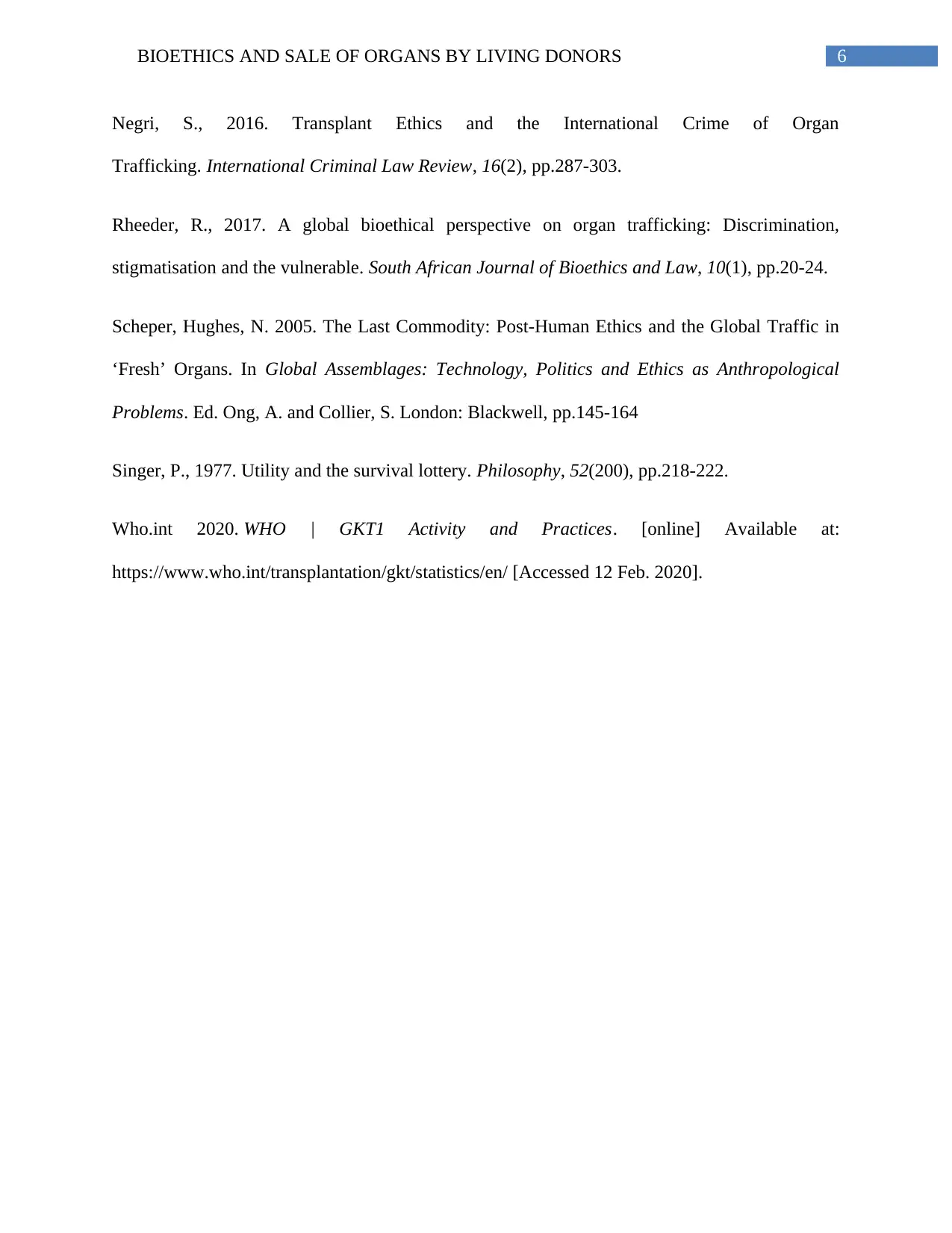
6BIOETHICS AND SALE OF ORGANS BY LIVING DONORS
Negri, S., 2016. Transplant Ethics and the International Crime of Organ
Trafficking. International Criminal Law Review, 16(2), pp.287-303.
Rheeder, R., 2017. A global bioethical perspective on organ trafficking: Discrimination,
stigmatisation and the vulnerable. South African Journal of Bioethics and Law, 10(1), pp.20-24.
Scheper, Hughes, N. 2005. The Last Commodity: Post-Human Ethics and the Global Traffic in
‘Fresh’ Organs. In Global Assemblages: Technology, Politics and Ethics as Anthropological
Problems. Ed. Ong, A. and Collier, S. London: Blackwell, pp.145-164
Singer, P., 1977. Utility and the survival lottery. Philosophy, 52(200), pp.218-222.
Who.int 2020. WHO | GKT1 Activity and Practices. [online] Available at:
https://www.who.int/transplantation/gkt/statistics/en/ [Accessed 12 Feb. 2020].
Negri, S., 2016. Transplant Ethics and the International Crime of Organ
Trafficking. International Criminal Law Review, 16(2), pp.287-303.
Rheeder, R., 2017. A global bioethical perspective on organ trafficking: Discrimination,
stigmatisation and the vulnerable. South African Journal of Bioethics and Law, 10(1), pp.20-24.
Scheper, Hughes, N. 2005. The Last Commodity: Post-Human Ethics and the Global Traffic in
‘Fresh’ Organs. In Global Assemblages: Technology, Politics and Ethics as Anthropological
Problems. Ed. Ong, A. and Collier, S. London: Blackwell, pp.145-164
Singer, P., 1977. Utility and the survival lottery. Philosophy, 52(200), pp.218-222.
Who.int 2020. WHO | GKT1 Activity and Practices. [online] Available at:
https://www.who.int/transplantation/gkt/statistics/en/ [Accessed 12 Feb. 2020].
1 out of 7
Related Documents
Your All-in-One AI-Powered Toolkit for Academic Success.
+13062052269
info@desklib.com
Available 24*7 on WhatsApp / Email
![[object Object]](/_next/static/media/star-bottom.7253800d.svg)
Unlock your academic potential
Copyright © 2020–2025 A2Z Services. All Rights Reserved. Developed and managed by ZUCOL.




